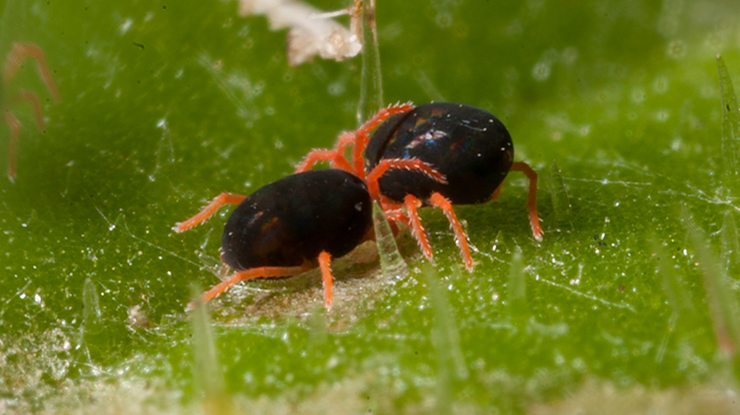 An MLA-funded project aims to reduce the significant impacts of the redlegged earth mite (RLEM) on grain and pasture productivity through improved pest management. Image credit: Andrew Weeks, Cesar Australia
An MLA-funded project aims to reduce the significant impacts of the redlegged earth mite (RLEM) on grain and pasture productivity through improved pest management. Image credit: Andrew Weeks, Cesar Australia
Free screening service to test for insecticide resistance in the redlegged earth mite
The redlegged earth mite (RLEM) is a pest affecting crops and pastures across southern Australia. The repeated use of limited registered chemicals for the control of this pest has resulted in the emergence and spread of insecticide resistance to synthetic pyrethroids (SPs) and organophosphates (OPs) across the southern regions of Australia.
Ongoing resistance surveillance shows that insecticide resistance in the RLEM to both SPs and OPs is now widespread across Western Australia and present in several regions in South Australia and Victoria.
Meat & Livestock Australia (MLA) is co-investing into a larger Grains Research and Development Corporation (GRDC) project led by Cesar Australia to extend the scope of the outputs from grains industry research and to validate these in pasture systems for the benefit of red meat producers.
Free screening service for producers
This project aims to reduce the significant impacts of RLEM on grain and pasture productivity through improved pest management. The work will lead to improved biological, cultural, and chemical control strategies for RLEM, and will help growers and advisors make better decisions around pesticide use. As part of this research, Cesar Australia is running a free screening service to test for insecticide resistance in populations from South Australia, Victoria, New South Wales and Tasmania.
Producers are asked to contribute to this research by getting in touch if they either noticed a chemical control failure, suspect insecticide resistance or have paddocks that continually require control of RLEM with pesticides.
This no-cost screening service is made possible through a GRDC investment and MLA co-investment being led by Cesar Australia in collaboration with the University of Melbourne, the Western Australian Department of Primary Industries and Regional Development and CSIRO.
The insecticide resistance screening service will not only help detect any resistance before it becomes widespread but will also assist in identifying the best control options for producers.
Cesar Australia will be undertaking field trips in the coming months to collect RLEM for resistance screening, so get in touch if you would like them to collect RLEM from your area. A collection kit can also be provided containing the necessary equipment to send mites in for screening if required.
RLEM management and helpful tools
Monitoring of populations and carefully timed sprays (if required) are important for RLEM management. For producers who are experiencing problems with RLEM, there are several decision aid tools to guide if and when pesticide usage is warranted. The complex lifecycle of RLEMs gives rise to critical monitoring periods.
In autumn, producers can use the redlegged earth mite hatch timing tool which can give an indication of when crop monitoring should increase, by predicting when mite eggs are likely to hatch.
The RLEM seasonal risk calculator is a tool that considers the different factors that contribute to RLEM abundances – such as paddock history, broadleaf weed coverage, and insecticide usage. It helps identify paddocks at risk of high mite infestations which may require chemical applications i.e. if the risk is low, it’s likely that chemicals will not be required.
The timerite tool can then be used to ensure sprays are applied at the correct time in spring to reduce RLEM numbers surviving through to the next season.
Producers can also refer to the RLEM Resistance Management Strategy to reduce chemical control failures and implement best management practices on-farm when it comes to managing RLEMs.



